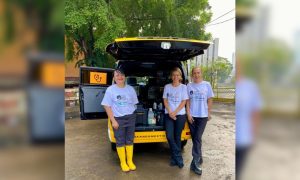On March 31st, a crude oil pipeline belonging to the Indonesian state-owned oil and gas company Pertamina burst in the Balikpapan Bay of Borneo, leading the government to declare a state of emergency. Five people were killed by a fire that broke out due to the spill, as were an endangered Irrawaddy dolphin and crabs who washed up dead on the shore.
Coastal residents experienced vomiting and suffocation from the fire as the oil slick quickly spread over 50 square miles into the Strait of Makassar. By April 6th the spill had already contaminated an area larger than the size of Paris, which stands at roughly 41 square miles. 84 acres of Mangrove forests are covered in oil in Kariagau Village and 6,000 Mangrove trees and 2,000 seeds are covered in Atas Air Margasari village.
Originally denying that the oil was from their pipeline, it took until April 4th for the government and Pertamina to admit that their pipeline was the cause of the leak, and until April 3rd for them to shut the pipes. They have yet to take full responsibility, as there is an ongoing investigation, claiming that the burst was the result of a foreign coal vessel’s anchor dragging the pipeline 120 meters from its original location. But whether it was an anchor or a faulty, old pipeline, the deathly results are the same. And crude oil is not a safe or sustainable energy source.
The Balikpapan Environmental Agency claims that cleanup is at 90 percent, due to containment and a chemical that disperses the oil to more readily dissolve in the water. But scientists have shown that cleanup is never finished. Only the surface of the water can be cleaned. And the initial damage of a spill can cause a lasting toxicity on an ecosystem.
25 years after the Exxon Valdez ruptured in Alaska, there are still oil slicks on the water and oil trapped beneath the beach. 4 years after Deepwater Horizon exploded in the Gulf of Mexico, dolphins and turtles were still dying in that area in greater numbers than ever before. It isn’t just about cleaning the surface, it’s about how far and how deep the oil travels.
Earlier in March, an oil spill in the Lizama and Magdalena Rivers in Colombia caused similar results. 70 families were treated for health problems and 2,400 animals were killed.
The evidence for ditching oil for renewable energy sources and keeping our waters free of pollution is astounding. Yet Indonesia was proposing three new pipelines in Borneo as recently as January of this year. If it’s possible for any good to come out of this latest oil disaster, it would be Indonesia recognizing the need for renewable energy sources and abandoning this plan.






